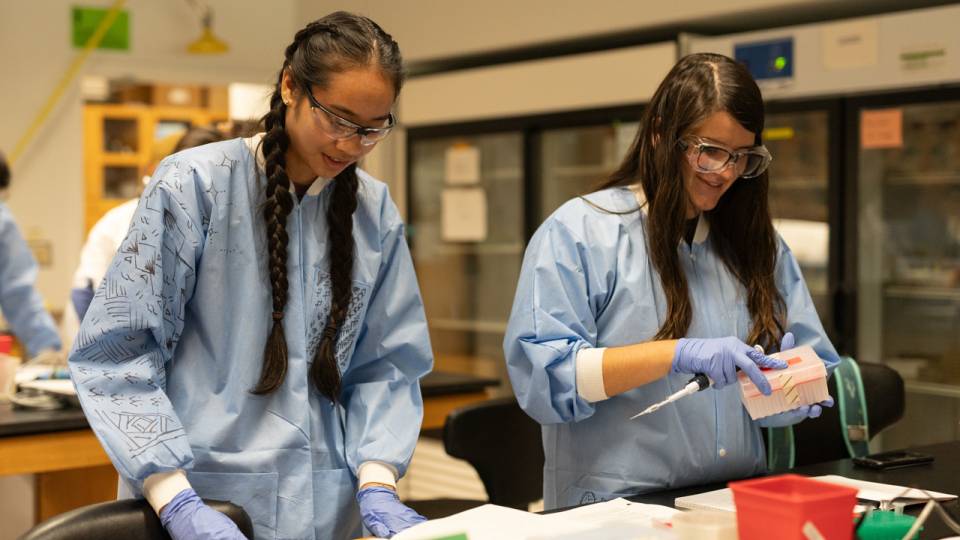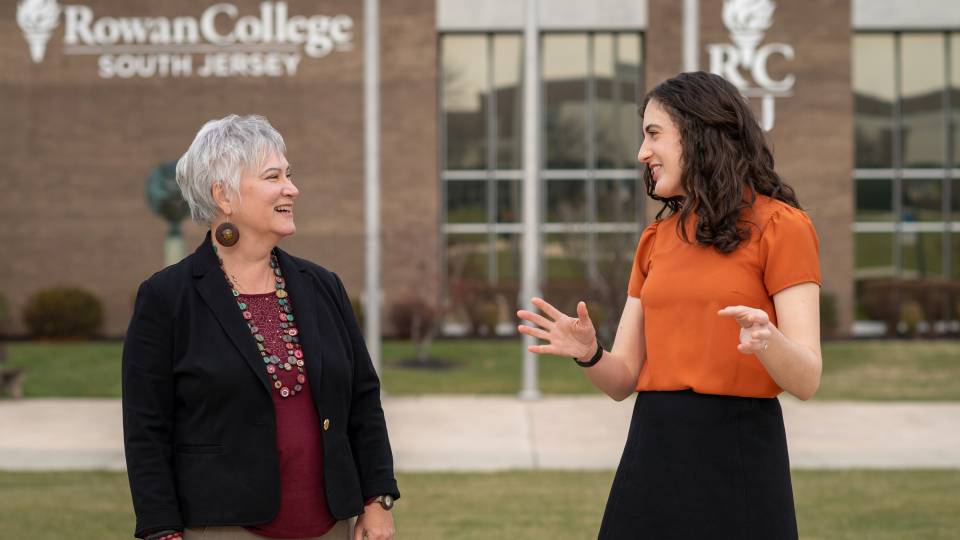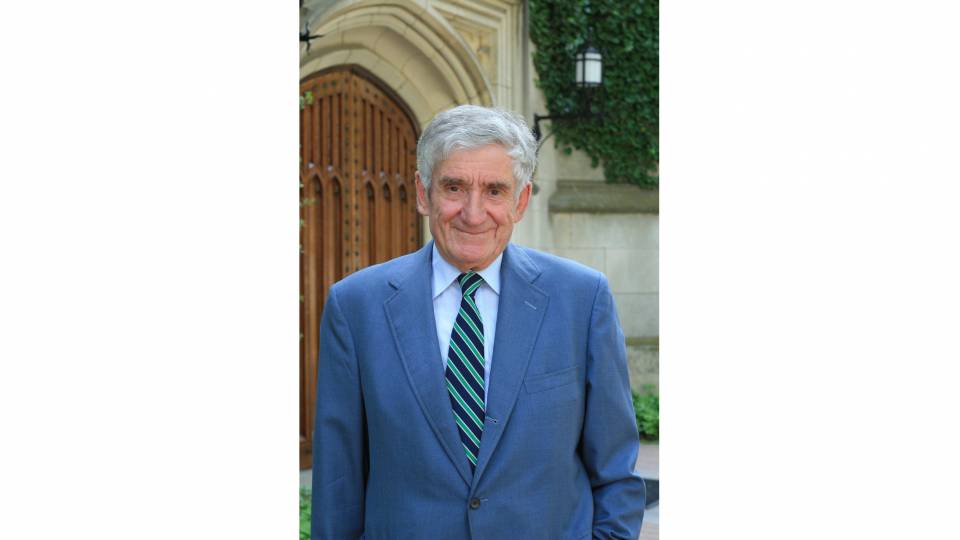From the Oct. 3, 2005, Princeton Weekly Bulletin
Mercer County Community College's Robin Schore has been in school for most of his life, both as a student and professor. Of all the courses he has taken or taught over the past 40 years, he credits a program at Princeton with providing his "fondest educational experience."
Schore is among more than 250 community college educators who have participated since 1977 in the Mid-Career Fellowship Program. The program offers classes and other revitalization opportunities at Princeton to faculty and administrators from 14 New Jersey community colleges.
"Periodically over my career, I burn out, dreading having to read and grade another student paper, sometimes hoping for the end of the semester on the first day of the semester," said Schore, currently dean of the liberal arts division at MCCC. "I was feeling exactly that way when I began the mid-career program. Within a week, I was cured."
The program was founded as a pilot project under a grant from the National Endowment for the Humanities by Theodore Rabb, Princeton professor of history. A scholar of Renaissance history, Rabb was educated at Oxford and Princeton. His longstanding interest in what he calls "the enterprise of higher education" prompted him to launch the program.
"One of the concerns I've always had is that the different elements of higher education in the United States really do need to work together," he said. "We all have distinct roles, but we're all in the same endeavor together. The community college faculty are the people in the trenches -- they're often the last best hope for young people or even older ones who are seeking some sort of further education.
"Princeton is at a different end of the spectrum, offering an intensive education, working to produce new faculty, and providing pre-professional and professional training of various kinds," Rabb continued. "But I always felt that we had a great deal to learn from one another because, although our roles are different, we are still engaged in the same business."
While the New Jersey community college system was still in its early years, Rabb recognized the critical need to help faculty members recharge their batteries. "The teaching loads are so horrendous at community colleges that they often have very little time to go back to their academic roots and, for example, study Keats," he said.
In addition to the NEH, the program was supported by the Mellon Foundation early on, but now is funded totally by the University and the community colleges: Atlantic Cape Community College, Bergen Community College, Brookdale Community College, Burlington Community College, Camden County College, Mercer County Community College, Middlesex County College, County College of Morris, Ocean County College, Passaic County Community College, Raritan Valley Community College, Sussex County Community College, Union County College and Warren County Community College.
"The program has been tremendously valuable to all the RVCC faculty who have attended," said Jerry Ryan, president of Raritan Valley Community College. "They cite personal regeneration and transformation. They enjoy their program colleagues and have a wonderful appreciation and respect for Ted."
Ryan, who is leaving the RVCC presidency, will have a chance to experience the program firsthand this year -- he is among the fellows selected for 2005-06. "I am looking forward to the program and my studies in nonprofit management at the Woodrow Wilson School," he said. "I hope to return to a community college presidency with a broader perspective."
Each college may nominate three people for the program. Applications are screened by an admissions committee and by the departments in which the fellows propose to do their work. The process is coordinated through Princeton's Graduate School.
A maximum of 12 fellows are admitted each year. All participants hold master's degrees, and a high proportion of them also have doctorates. They enroll in one regular course at Princeton for credit, and they also can informally audit other courses to which they are admitted by the professor. In addition, they attend a seminar every other week led by Rabb that explores various issues facing community colleges today.
Mercer County Community College's Schore, who was a Mid-Career Fellow in 1999-2000, said, "I adored reading obscure texts about medieval French society for Professor Bill Jordan. I adored racing through all of Jane Austen and much of Maria Edgeworth for Professor Claudia Johnson. But most rewarding of all was the course in 'Paradise Lost' that I took with Professor Earl Miner, the last course that he taught before retirement. Finally, I was old enough to read Milton with glee, and I hold Professor Miner entirely responsible for adding a vital area that was missing from my education."
Ilene Rutan, a professor of English at Brookdale Community College, enrolled in a course on "Ethics and Public Policy" offered through the Woodrow Wilson School of Public and International Affairs and the politics department during her 2001-02 fellowship. "The class was fantastic," she said. "I took my new knowledge back to Brookdale and used this knowledge to revise and teach a course in 'Propaganda and Critical Thinking.'"
Rabb said that the classes also often benefit from the presence of the Mid-Career Fellows. "Many of my colleagues have said that they've enjoyed having an older person in the class," he said. "Sometimes those older people play the role of a surrogate parent amidst the graduate students. They bring life experiences. We've had a number of cases where fellows and faculty have collaborated on research projects. I think they're just an enlivening and very different kind of presence."
It's Rabb's seminar, however, and the subsequent informal dinners at a local restaurant, that draw the most response from graduates of the program.
"Professor Rabb provided a comfortable learning environment where the faculty fellows could exchange ideas," said Carole Holden, a faculty member at the County College of Morris. "He challenged us to think beyond our existing beliefs and to implement new ideas into our course assignments and final papers. Dinners at the Annex also expanded our knowledge base because social, cultural and political current events were always part of the conversation."
The seminars have covered issues ranging from how to teach a class that contains students with a wide range of learning abilities to the effect of unions on professional commitments. Fellows choose a topic on which they write a paper that is discussed in the seminar. Dorothy Altman, a faculty member at Bergen Community College, said that the research she conducted for the seminar helped her strengthen the honors program at her institution. She then shared her paper with colleagues at Atlantic Cape Community College, who used it to help initiate their honors program.
While delving into topics of mutual interest, the fellows often build a lasting bond with their classmates. "By participating in Professor Rabb's seminar with other community college professors like yourself you get to know them," said Saul Kelton, a faculty member at Middlesex County College. "It is like looking in the mirror and seeing yourself. Their concerns are yours and yours are theirs. During the seminar you learn from them and they learn from you. Their respect for your intellectual abilities and contributions deepen your respect for yourself."
"I treasure the camaraderie and opportunity to see differences and similarities among the fellows and the other New Jersey community colleges the most," said Nancy Kegelman, interim dean of academic affairs at Brookdale Community College.
A few changes are in store for the program in the future. Rabb, who has taught at Princeton since 1967, plans to retire at the end of the academic year. In anticipation of that occasion, 100 former fellows gathered last April on campus to honor him.
Responsibility for the program will transfer to the McGraw Center for Teaching and Learning at Princeton. "The McGraw Center is delighted to be carrying on this wonderful program," said Director Linda Hodges, "and we hope to see Ted's legacy continue for many more years."



